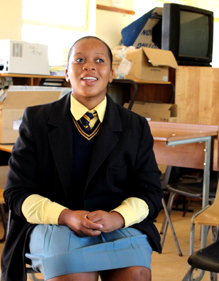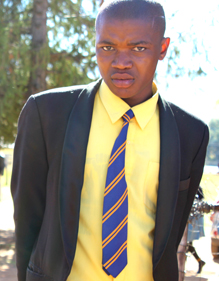|
Getting your Trinity Audio player ready...
|
 By Gcina Ntsaluba
By Gcina Ntsaluba
Deep in the mountains of the Drakensberg, at Moshesh Senior Secondary School in Queen’s Mercy, a rural village near Matatiele in Eastern Cape, is an inspiring story of two grade 12 pupils who are holding the provincial and national departments of education accountable for the poor governance and appalling learning conditions at their school. For this, they are our heroes of the week.
Palesa Manyokole and her brother, Zamuxolo Wesley Moutloali, are leading a legal challenge against the departments to ensure that their school gets dedicated teachers, textbooks and a sober principal so that the facility can be effectively managed.
The siblings at the no-fee Moshesh Senior Secondary School have become a voice for a generation of rural school kids, and are speaking out to inspire others to realise that education is their only way out of poverty. They are willing to fight for their rights to education and a school free from abuse and gross mismanagement.
In Palesa’s founding affidavit, supported by other learners and filed in the Bhisho High Court in November 2012, she sets outs how the principal, Mr Matlokotsi Leeu, was absent from school for 10 months. Some teachers in the school, the affidavit goes on to say, came to school late and intoxicated.
The school has been put under administration by the provincial department and the principal has been suspended for maladministration and financial misconduct.
 “Initially, Mr Leeu was charged with maladministration, but while we were undergoing that process, we discovered that there was also financial misconduct and embezzlement of school funds, so we investigated further to bring in these new charges,” says the director of education in Maluti district, Lungelo Mtatyana.
“Initially, Mr Leeu was charged with maladministration, but while we were undergoing that process, we discovered that there was also financial misconduct and embezzlement of school funds, so we investigated further to bring in these new charges,” says the director of education in Maluti district, Lungelo Mtatyana.
Mtatyana said the principal had failed to pay a service provider for stationery even though the department had given the school money for this purpose. He also had failed to place an order for textbooks on time.
Not enough
But the learners want more action from government. They are calling for the department to provide adequate teaching staff, textbooks and hostel accommodation. They also want a “catch-up” plan to be implemented for affected grade 10 and 11 learners who did not complete 2012’s syllabus because of a lack of resources.
Furthermore, they call on the court to declare the provincial department’s conduct, which the dysfunctional school accounts to, a violation of their rights to basic education, dignity and a healthy environment.
In its answering affidavit the provincial department of education denies a shortage of teachers and textbooks, among other things. According to it, the learners’ court application effectively amounts to a series of complaints already addressed.
“The applicants have effectively bypassed the school governing body, the principal and the district office in bringing this application. The district has been aware of the problems the school has experienced in the past and effective measures have been taken …” It does not state what these measures were.
Corruption Watch, however on visiting the school in early May, saw a different picture. Learners were lingering outside the classrooms and grounds during school hours, as teachers were nowhere to be seen. Others went home as early as noon out of frustration.
Resonated with schools campaign
Moshesh School initially caught Corruption Watch’s attention as the issues resonated with the organisation’s corruption in schools’ campaign, which focusses on abuse of power and maladministration in public schools.
Since its launch in January 2012, Corruption Watch has received ongoing complaints of corruption in state schools, abuse of power at the hands of principals and teachers, embezzlement of funds, irregularities in procurement and dysfunctional school governing bodies.
The Matatiele learners, represented by activist group Equal Education, will have their version of events tested against the state’s response on 18 June 2013 at the Bisho High Court.
Equal Education’s national organiser Samuel Shapiro says: “This case is a classic example of how democracy can be used to hold those in power accountable.” The organisation intends to stand by the learners to ensure that the school is normalised, with sufficient teachers and learning material.
“The two siblings are champions of democracy,” Shapiro says, and “an example to many other students out there who are not satisfied with the level of education that they are getting”.
Shapiro encourages other learners to speak out against abuse of power and demand quality education.
Palesa looks forward to the changes that the court challenge could bring about. Her dream for the future is to study human resources management at the University of Cape Town. She says her love of helping people is what drives her, and that she is not afraid of taking on the authorities because it will better someone else’s future too.
“We are fighting for our lives and future, if we are denied the right to good education we will remain in poverty so we want from the department what we are supposed to get, good education,” says the fiery and straight-talking youngster.



